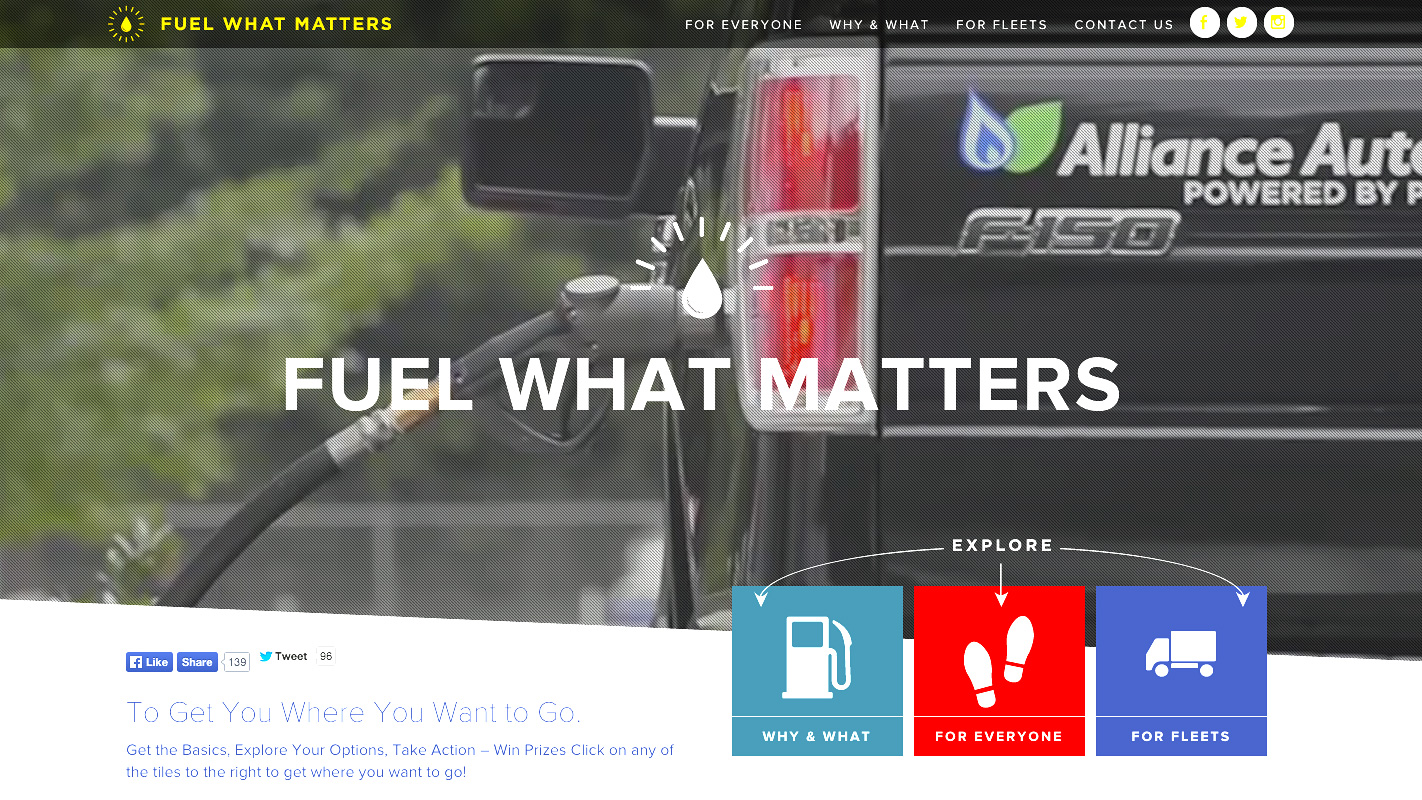A public service center based at NC State is leading a federally funded campaign to clean up North Carolina’s air, and citizens who lend a hand can win cash prizes for participating.
The North Carolina Clean Energy Technology Center (formerly the Solar Center) has launched a public education campaign called Fuel What Matters to help individuals and organizations make transportation choices that will reduce emissions in North Carolina. More than half of our state’s citizens live in counties that don’t meet national air quality standards, and transportation is the No. 1 source of air pollution in the state’s urban areas, says Anne Tazewell, manager of the Transportation Program at the Clean Energy Technology Center.
“That’s why, to address this problem, the federal government provides Congestion Mitigation Air Quality funding to the North Carolina Department of Transportation, and the DOT in turn granted the funds to us,” Tazewell says. “CMAQ funding is focused on transportation because if you can reduce emissions from that one source, you can make a major improvement in air quality.”
Improving air quality is important for safeguarding human health, especially among children. Tailpipe emissions lead to the creation of ground-level ozone, which can exacerbate asthma symptoms — and asthma is the No. 1 reason why children miss school in North Carolina, according to the center.
Cleaning up the air is good for the economy, too.
“Businesses don’t want a poor-air-quality designation where they’re located or considering locating because it makes it more difficult for them to receive approval to build facilities that emit pollutants,” Tazewell explains. “If we want to keep the companies we have and attract new ones, we need to reduce emissions now.”
Three Decades of Progress
The Clean Energy Technology Center was a natural choice to lead the emissions-reduction campaign. The center took shape in the wake of the founding of NC State’s Solar House, built in 1981 as a demonstration home to show how solar power could fuel a modern lifestyle without harming the environment or damaging people’s health. The team who founded the house saw a need for additional projects to promote sustainable energy, and they found ways to fund those projects; but the more time went on, the more they saw a need to create a new organization to properly coordinate their efforts.
That organization became a reality in 1987 when the Solar Center was founded at NC State to conduct and support research and implementation of solar power technology. Over time, the center’s scope broadened to encompass other aspects of clean and sustainable energy, eventually leading to its renaming as the Clean Energy Technology Center in 2014. Now the center is part of the College of Engineering and is a respected resource serving the burgeoning clean tech sector in North Carolina, in addition to building its reputation as one of the premier clean energy centers in the United States.
Economic Incentives
Tazewell says that along with the environmental and health reasons for reducing emissions, there are compelling economic incentives related to the need for energy diversity.
“About 93 percent of America’s transportation is fueled by petroleum,” she says, “but we only hold about 2 percent of global fuel reserves. Most of the world’s petroleum is in Middle Eastern countries, like Saudi Arabia. On the other hand, if you look at natural gas, we’ve got plenty of that right here, enough to last us well into the next century. The U.S. is the Saudi Arabia of natural gas. So anything we can do to burn less petroleum in our cars and trucks makes us less dependent on other countries for our energy future.”
A Wealth of Information and Tools
To help North Carolinians cut down on petroleum use, the Fuel What Matters website provides tools designed specifically for individuals and for transportation fleet managers. For individuals, the site offers information to help consumers purchase automobiles that run on alternative fuels, such as electricity, biodiesel, ethanol, natural gas and propane. It also provides a handy mapping and scheduling tool for planning trips via walking, biking or public transit.
For fleet managers, Fuel What Matters offers information on how to implement the use of alternative fuels across a fleet, first by conducting a fleet assessment and then by determining which alternative fuel vehicles are best for your business or organization.
“A lot of people don’t realize how much sense alternative fuels make from a business standpoint,” Tazewell notes. “For instance, electric vehicles cost two-thirds less to drive than petroleum vehicles because electric motors are more efficient than internal combustion engines. And these are big, reputable companies manufacturing these alternative-fuel vehicles, like General Motors, Ford, Nissan. You can be confident that you’re buying a good vehicle for your fleet, with good service and support behind it.”
Win Cash Prizes
To encourage North Carolinians to spread the word about clean transportation, the campaign is offering cash prizes to those who post about the campaign on social media. Include the hashtag #fuelwhatmatters in a post on Facebook, Twitter or Instagram to be entered in a random drawing for a $100 prize. The prize drawings will be held monthly between now and mid-October. You can also submit a Fuel What Matters video for a chance to win $500. Details are available at the website.
- Categories:



